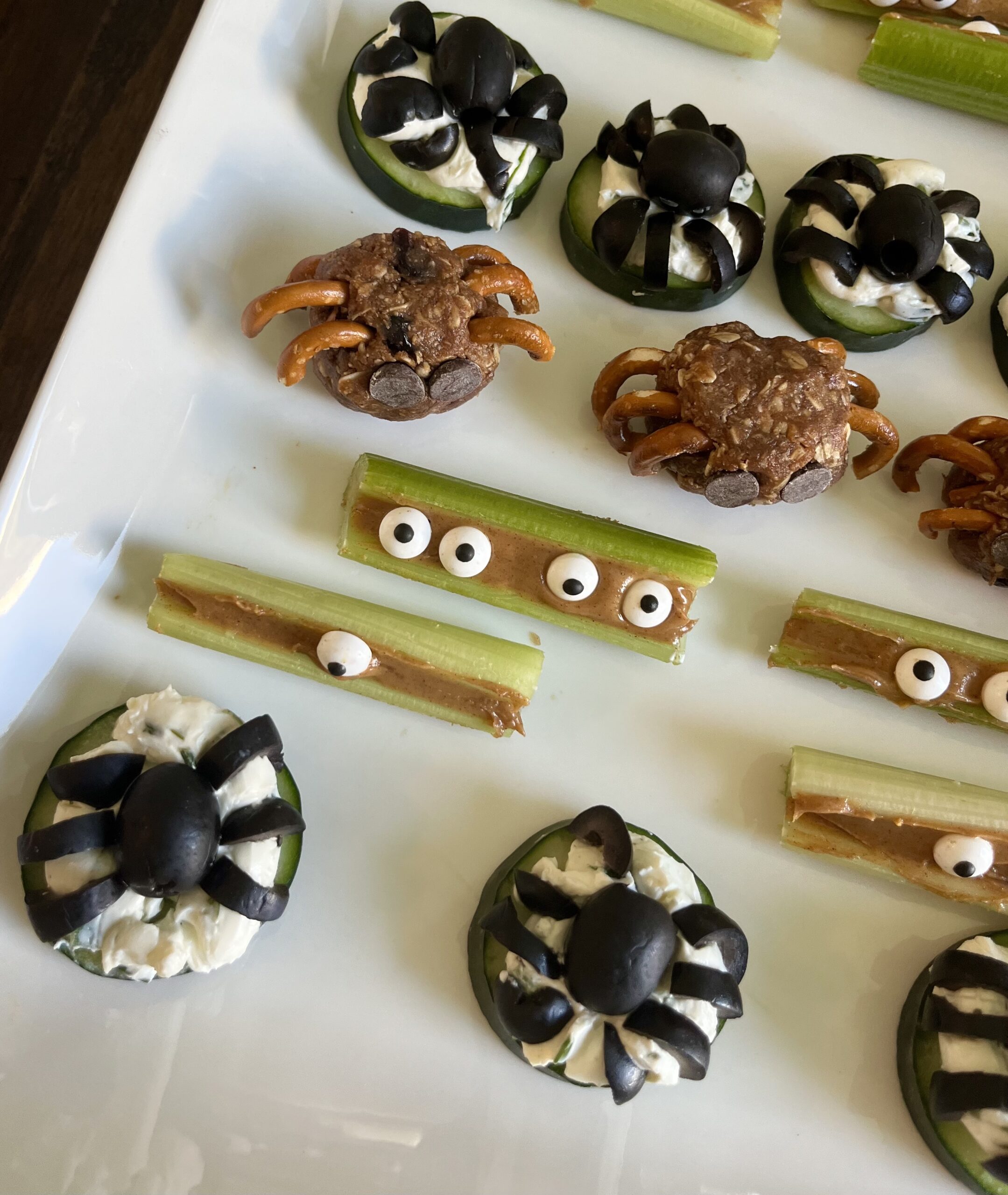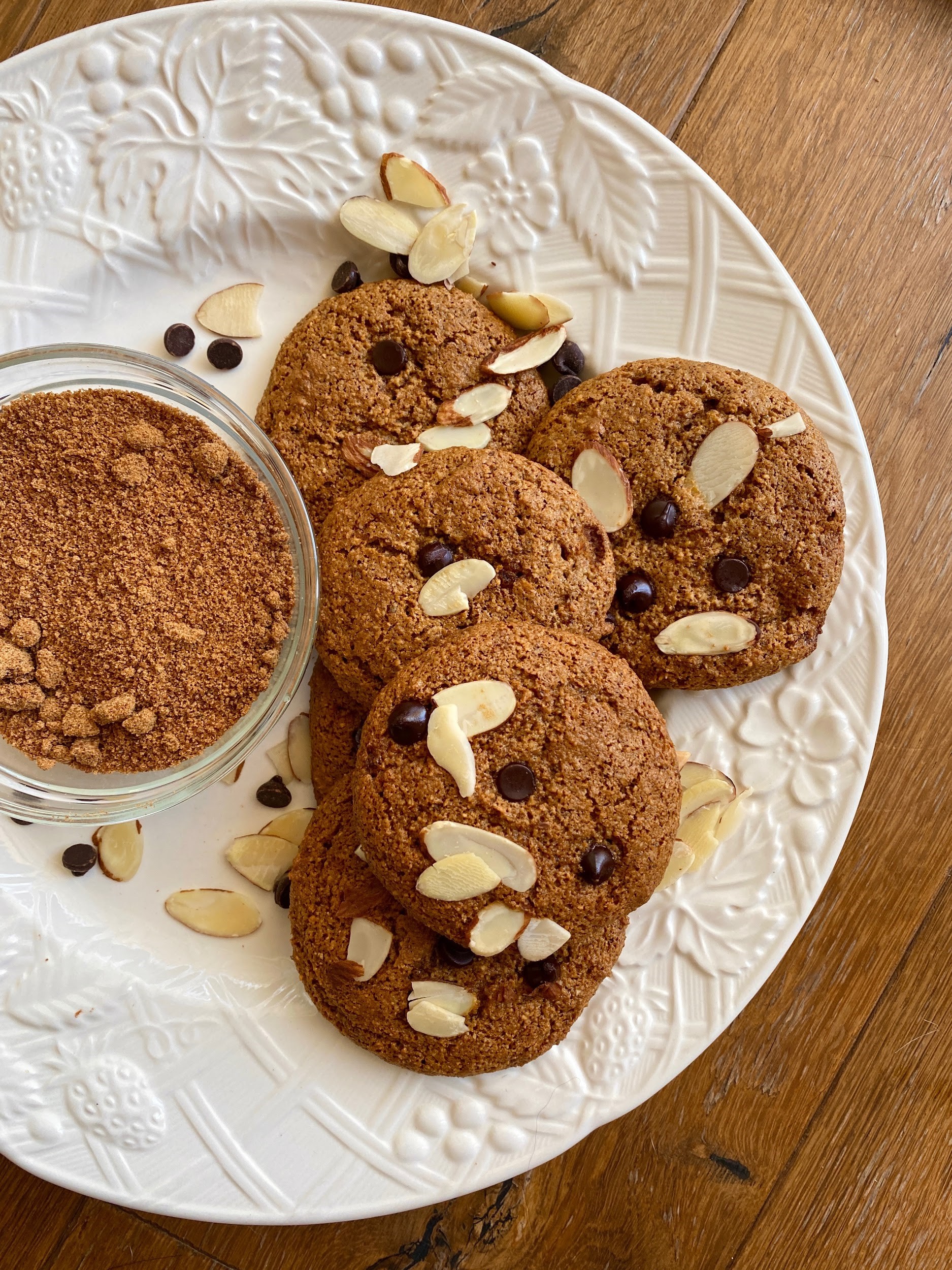6 Nutrients for Luscious Glowing Skin and 5 DIY Face Masks
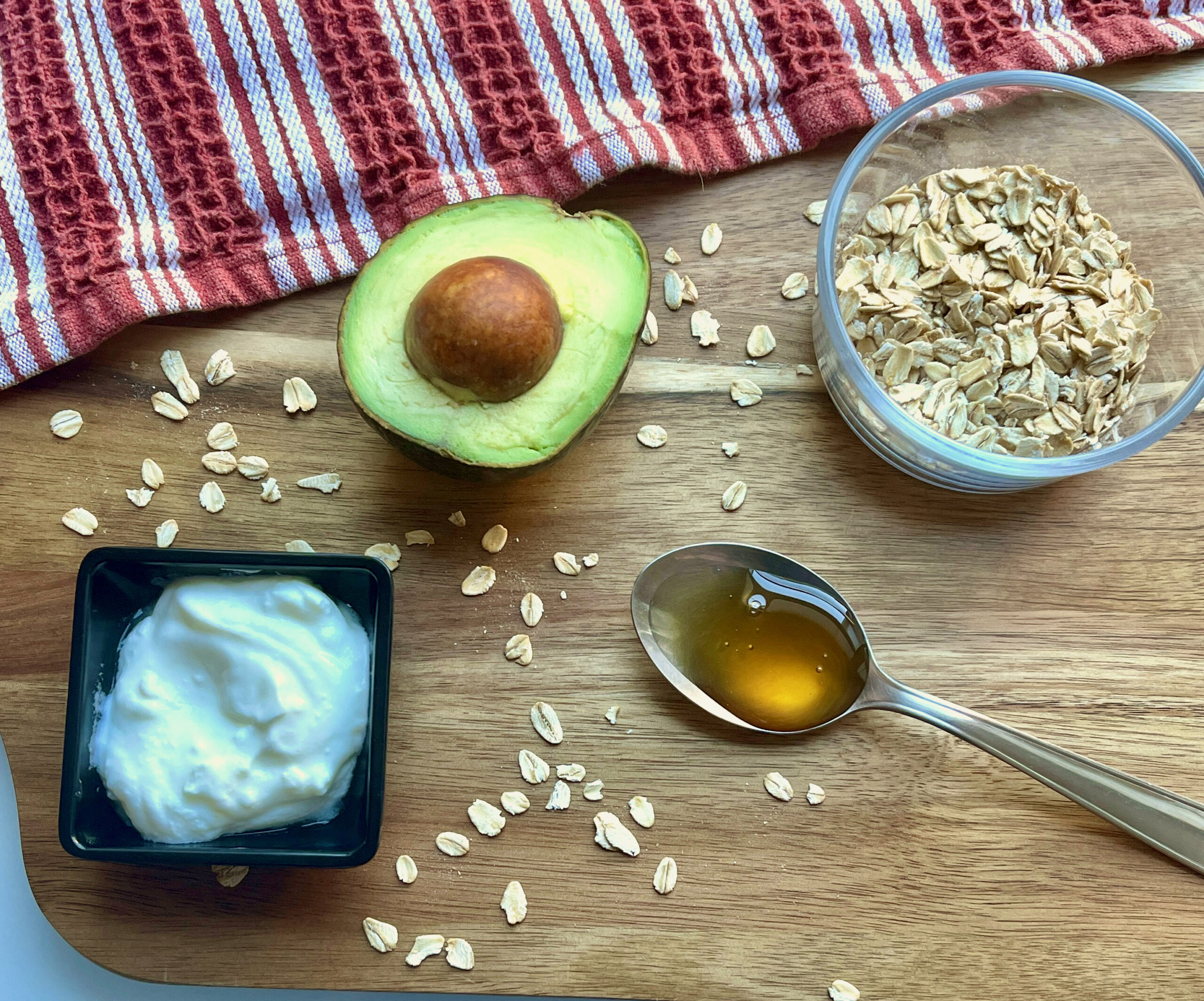
We all know that wearing SPF helps protect our skin from aging. And we’re going to share with you another key secret for incredible skin health. In addition to topical methods for optimal skin health, consuming foods that supply vitamins, minerals, and phytonutrients, can also help protect our skin from signs of aging and sun damage. Here are 6 Nutrients for Luscious Glowing Skin and 5 DIY Face Masks. Time to feed the largest organ in our bodies.
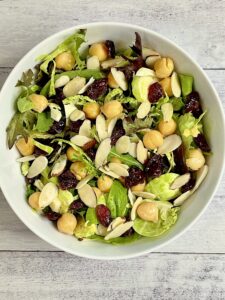
Vitamin C
Vitamin C, also known as ascorbic acid, is a popular vitamin commonly used topically for its antioxidant properties for radiant skin. Our bodies cannot make vitamin C, so it is important that we get it through food. Collagen is a protein that helps support the structure and function of our skin. However, for collagen to be able to do its job, it needs the help of vitamin C.1 Studies have shown that when used topically, vitamin C has the potential to reduce the damage caused by UV exposure.1 While using vitamin C on top of skin is great, we also receive skin health benefits when we consume vitamin C-rich foods.
Generally, women need 75 milligrams daily and men need 90 milligrams of vitamin C.2 It is a water-soluble vitamin, meaning the body can’t store it. Any excess will be eliminated from the body. This is why it is better to get your vitamin C through food sources instead of a supplement which just bombards your body with a high dose of vitamin C, that the body can’t retain.
Beauty starts from within, so if you want glowing skin make sure to include a variety of fruits and vegetables in your diet. Citrus fruits such as oranges, lemons, and grapefruit, are excellent sources of vitamin C.3 Other food sources include strawberries, kiwis, bell peppers, potatoes, tomatoes, and cruciferous vegetables such as broccoli, cabbage, and Brussels sprouts.3
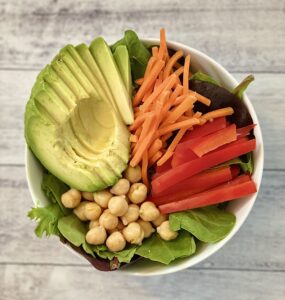
Vitamin E
Vitamin E is fat-soluble; this means that it is better absorbed when paired with a healthy fat. It is a powerful antioxidant that plays an essential part in the skin’s defense against UV damage and free radicals.4 Vitamin E is also anti-inflammatory, which is important in skin health. Studies show that topical vitamin E prevents inflammatory damage caused by UV exposure by reducing signs of skin inflammation such as swelling, edema, and redness of the skin.4 Vitamin C and E have been found to work better together to protect the skin from signs of aging. One study found that a serum containing the two vitamins along with raspberry leaf extract improved the elasticity, radiance, and appearance of wrinkles on the skin.5
Most adults only need about 15 milligrams of vitamin E daily, however some individuals may require more or less.6 To make sure you are getting enough vitamin E in your diet, be sure to include foods, such as nuts and seeds (almonds, sunflower seeds, hazelnuts, peanuts), vegetables (spinach, broccoli), and vegetable oils (wheat germ oil, sunflower oil, safflower oil).6
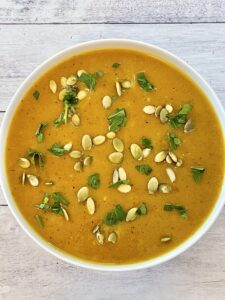
Vitamin A
Vitamin A is another fat-soluble vitamin. When applied topically vitamin A or retinol has been shown to decrease fine-lines, improve smoothness, alleviate hyperpigmentation, and reduce sun damage.7
Not getting enough vitamin A in your diet can result in dry skin. Vitamin A can be found in animal products, such as dairy, eggs, and fish.8 Carotenoids (another fabulous source of vitamin A) are commonly found in plant food sources, such as fruits and vegetables.8 Foods high in vitamin A include green leafy vegetables (kale, broccoli, spinach), yellow and orange vegetables (pumpkin, carrots, sweet potatoes), as well as red bell peppers, tomatoes, mangoes, and cantaloupe. In general, men need 900 micrograms daily and women need 700 micrograms of vitamin A.8 To ensure you are getting enough vitamin A in your diet for hydrated, healthy skin, make sure to eat a variety of different colored vegetables and fruits daily.
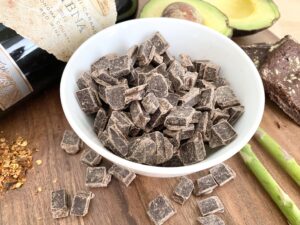
Polyphenols
Polyphenols have become the latest rage in anti-aging beauty products.9 They are naturally occurring compounds in plants that provide antioxidant protection.1 They can protect your skin from sun damage and even help prevent skin cancer caused by UV exposure.9
They include flavonoids, resveratrol, and lignans.1 Foods rich in polyphenols are red grapes, blueberries, raspberries, and other fruits and vegetables. Polyphenols can also be found in tea, coffee, wine, and chocolate.1 Add in some cacao to your next berry-packed smoothie for a polyphenol powerhouse.
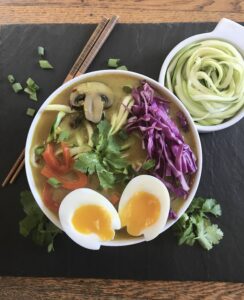
Zinc
Zinc is a micronutrient that is commonly used in dermatology for skin conditions such as acne, rosacea, warts, and psoriasis.10 One study found that a cream containing zinc helped to reduce wrinkles by increasing elastin synthesis, which is important for the stretch, recoil, and elasticity of the skin.11 Although it is commonly used in a lot of topical dermatology products, consuming foods high in zinc can have beneficial effects on skin health as well.
Generally, most women only need about 8 milligrams of zinc daily, while men need 11 milligrams.12 You can up your intake of zinc by incorporating foods rich in this nutrient, such as fish, seafood, dairy products, eggs, legumes, nuts, and whole grains.
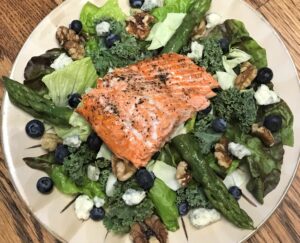
Omega-3s
Omega-3 fatty acids are well known for their amazing benefits on health and protecting against diseases. In addition, research shows that a diet rich in omega-3s can help protect skin against sun damage, acne, and even dry skin.13, 14 It can improve the skins hydration by sealing in moisture. And they are packed with anti-inflammatory benefits.
To incorporate more omega-3s into your routine for healthier, glowing skin, consume foods rich in this fatty acid, such as fatty fish (salmon, tuna, sardines), walnuts, chia seeds, hemp seeds, and ground flax meal.15 Sprinkle chia seeds over your morning oatmeal to for radiant skin from within.
5 DIY Face Masks
These 5 DIY Face Masks use common foods easily found in most homes. Since the skin is the largest organ on the body, using ingredients that we would also ingest orally is ideal regarding absorption and how the body reacts to these foods. Take some self-care time for you and enjoy a relaxing face mask. The best part is they are easy to make, too!
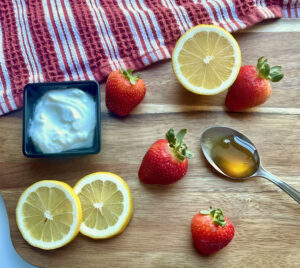
Improve Skin Tone
Looking to improve the texture of your skin? Look no further, this face mask contains strawberries and lemon juice, which supply your skin with vitamin C, that reduces damage caused by the sun, such as sun spots. Strawberries also contain salicylic acid, which can improve the texture and appearance of the skin.
Ingredients:
- 4 Crushed strawberries
- 1 Tbsp plain yogurt
- 1 Tbsp honey
- ½ Tbsp lemon juice
Directions:
- In a bowl, mash up strawberries.
- Add in yogurt, honey, and lemon juice. Stir to combine.
- Apply to clean, dry face for 10-15 minutes.
- Wash off with warm water.
Watch this video on how to easily make the Improve Skin Tone Face Mask:
Watch me put on this Face Mask to Improve Skin Tone:
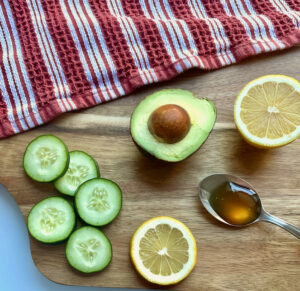
Oily Skin
Oily skin can be frustrating. This face mask combines the powers of cucumber and avocado to help combat oily skin. Cucumbers act as an astringent, which can help to reduce pore size, and improve oil production. Oily skin can also be a sign that your skin is dehydrated. Avocados contain vitamin E, which can help improve the hydration of your skin.
Ingredients:
- ½ Avocado
- ¼ Cucumber
- 1 Tbsp lemon juice
- 1 Tbsp honey
Directions:
- In a blender or using a hand-held blender, blend all ingredients until smooth.
- Apply to clean, dry face for 10-15 minutes.
- Wash off with warm water.
Watch this video on how to easily make the Face Mask for Oily Skin:
Watch me put on this Face Mask for Oily Skin:
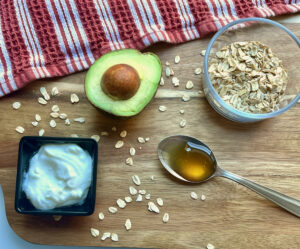
Hydrate/Nourish
Cold weather can lead to your skin feeling extra dry. To help improve the hydration of your skin, try out this face mask that contains avocado, honey, oats, and yogurt, which work together to improve skin hydration and provide nourishment. Oats contain zinc, which has been shown to reduce the appearance of wrinkles. Oats and avocado also provide the skin with vitamin E, which can help trap moisture in your skin, improving skin hydration.
Ingredients:
- ½ Avocado
- 1 Tbsp honey
- 2 Tbsp oats
- 1 Tbsp plain yogurt
Directions:
- In a bowl, mash up the avocado.
- Add in remaining ingredients. Stir to combine.
- Apply to clean, dry face for 10-15 minutes.
- Wash off with warm water.
Watch this video on how to easily make the Hydrate Nourish Face Mask:
Watch me put on this Face Mask to Hydrate and Nourish Your Skin:
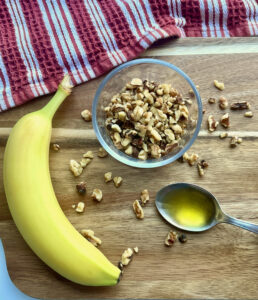
Protect
Protecting our skin from the damaging effects of the sun is best for anti-aging. This DIY face mask uses ingredients that are known for protecting against sun damage. The walnuts in this mask provide omega-3s, which can help reduce damage caused by UV radiation.
Ingredients:
- Handful of chopped walnuts
- 1 Ripe banana
- 2 Tbsp olive oil
Directions:
- In a bowl or mortar/pestle, grind the walnuts to a powder.
- Add banana. Mash with a fork. Add oil. Mix.
- Apply to clean, dry face for 10-15 minutes.
- Wash off with warm water.
Watch this video on how to easily make the Protect Your Skin Face Mask:
Watch me put on this Face Mask to Protect Your Skin:
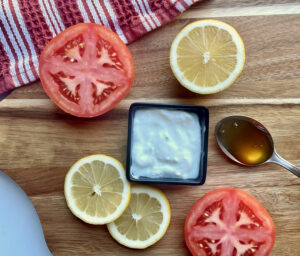
Radiant Skin
This face mask, made with tomatoes, honey, lemon juice, and yogurt, contains nutrients to help optimize glowing skin. Tomatoes contain vitamin A, which has been shown to reduce dark spots and improve skin smoothness. The tomatoes and lemon juice also have vitamin C, which give skin a youthful glow.
Ingredients:
- Tomato pulp from one tomato
- 1 Tbsp honey
- ½ Tbsp lemon juice
- 1 Tbsp plain yogurt
Directions:
- Cut tomato in half. Use a spoon to scoop out the pulp into a bowl.
- Add in honey, lemon juice, and yogurt to the bowl. Mix well to combine.
- Apply to clean, dry face for 10-15 minutes.
- Wash off with warm water.
Watch this video on how to easily make the Radiant Skin Face Mask:
Watch me put on this Face Mask for Radiant Skin:
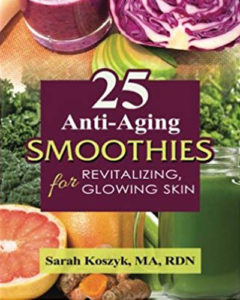
Now that we know 6 Nutrients for Luscious Glowing Skin and 5 DIY Face Masks, check out my book:
25 Anti-Aging Smoothies for Revitalizing, Glowing Skin
Get an infograph with the 5 DIY Face Masks
DIY Face Masks
**There are affiliate links in this post and I will be compensated if you buy the products using these links BUT there is no extra charge to you!
References for 6 Nutrients for Luscious Glowing Skin and 5 DIY Face Masks:
- Nutrition and youthful skin. Clinics in Dermatology. https://www.sciencedirect.com/science/article/pii/S0738081X21000717?via%3Dihub. Published May 13, 2021. Accessed December 7, 2022.
- Vitamin C. The Nutrition Source. https://www.hsph.harvard.edu/nutritionsource/vitamin-c/. Published May 27, 2021. Accessed December 7, 2022.
- Office of dietary supplements – vitamin C. NIH Office of Dietary Supplements. https://ods.od.nih.gov/factsheets/VitaminC-HealthProfessional/. Accessed December 7, 2022.
- Vitamin E and skin health. Linus Pauling Institute. https://lpi.oregonstate.edu/mic/health-disease/skin-health/vitamin-E. Published January 3, 2022. Accessed December 7, 2022.
- Rattanawiwatpong P. Anti‐aging and brightening effects of a …. Wiley Online Library. https://onlinelibrary.wiley.com/doi/full/10.1111/jocd.13305. Accessed December 7, 2022.
- Office of dietary supplements – vitamin E. NIH Office of Dietary Supplements. https://ods.od.nih.gov/factsheets/VitaminE-HealthProfessional/. Accessed December 7, 2022.
- Vitamin A and skin health. Linus Pauling Institute. https://lpi.oregonstate.edu/mic/health-disease/skin-health/vitamin-A. Published January 3, 2022. Accessed December 7, 2022.
- Vitamin A. The Nutrition Source. https://www.hsph.harvard.edu/nutritionsource/vitamin-a/. Published July 5, 2022. Accessed December 7, 2022.
- Schagen SK, Zampeli VA, Makrantonaki E, Zouboulis CC. Discovering the link between nutrition and skin aging. Dermatoendocrinol. 2012;4(3):298-307. doi:10.4161/derm.22876
- Gupta M, Mahajan VK, Mehta KS, Chauhan PS. Zinc therapy in dermatology: a review. Dermatol Res Pract. 2014;2014:709152. doi:10.1155/2014/709152
- Mahoney Mỹ G., Brennan D, Starcher B, et al. Extracellular matrix in cutaneous ageing: The effects of 0.1% copper-zinc malonate-containing cream on elastin biosynthesis. Experimental Dermatology. 2009;18(3):205-211. doi:10.1111/j.1600-0625.2008.00783.x
- Office of dietary supplements – zinc. NIH Office of Dietary Supplements. https://ods.od.nih.gov/factsheets/Zinc-HealthProfessional/. Accessed December 8, 2022.
- Petre A. 6 benefits and uses of omega-3s for skin and hair. Healthline. https://www.healthline.com/nutrition/omega-3-benefits-on-skin-and-hair#2.-May-reduce-acne. Published November 28, 2019. Accessed December 9, 2022.
- Essential fatty acids and skin health. Linus Pauling Institute. https://lpi.oregonstate.edu/mic/health-disease/skin-health/essential-fatty-acids. Published January 3, 2022. Accessed December 9, 2022.
- Office of dietary supplements – omega-3 fatty acids. NIH Office of Dietary Supplements. https://ods.od.nih.gov/factsheets/Omega3FattyAcids-HealthProfessional/. Accessed December 9, 2022.
Related Posts
Get 10 Must-Have Protein-Rich Powerhouse Snacks
These will fuel and satiate you.
You’ll also get access to my newsletter for the latest recipes, health tips, and exclusive offerings.

